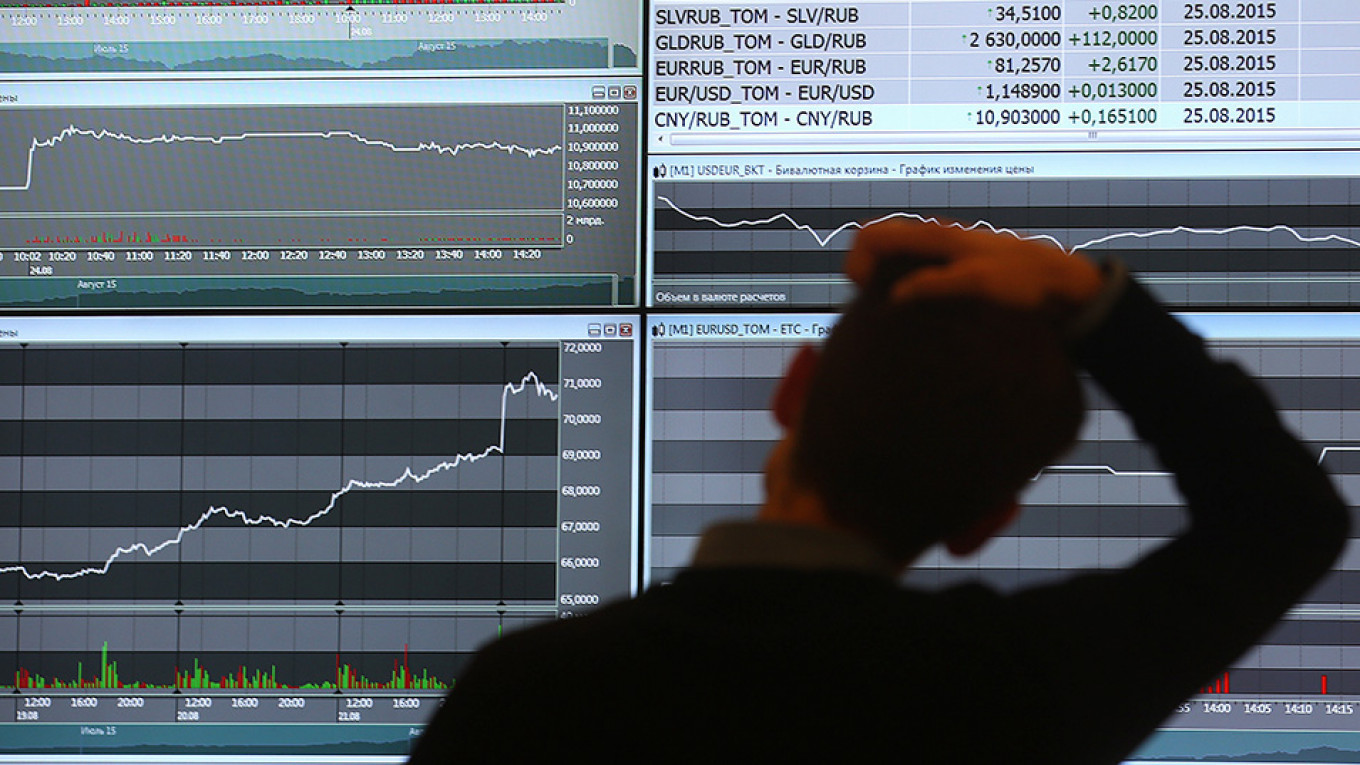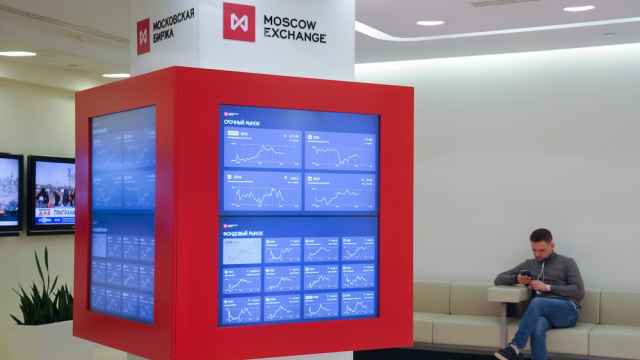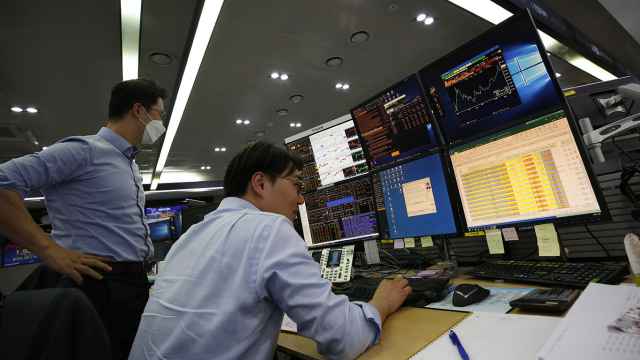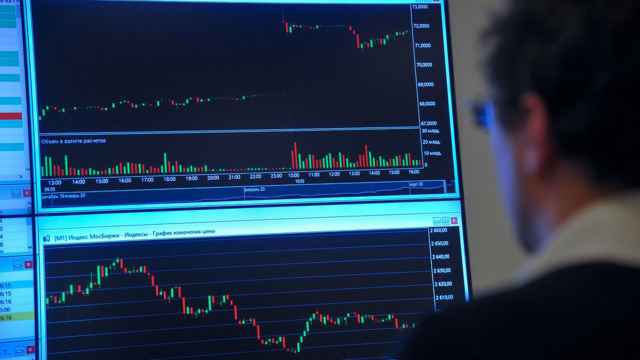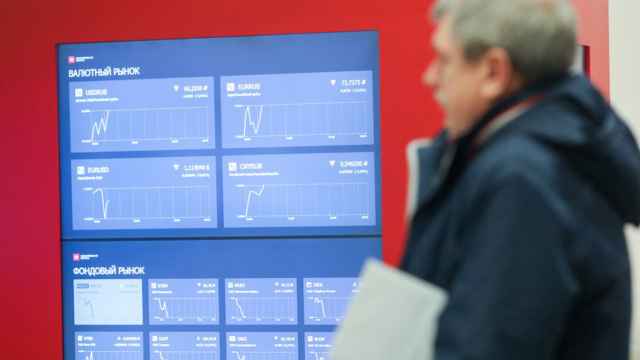The turmoil rocking financial markets has highlighted Russia’s dilemma over how to deal with the country’s retail investment boom.
The market swings of recent days — which saw the Russian stock market fall by more than 10% on opening Tuesday and billions lost on worldwide markets — is the kind of event Russia’s Central Bank has spent months warning could hurt the millions of ordinary Russians who have stormed into the stock market in recent years.
But brokers and banks say the explosion of interest in the stock market and investing is no cause for concern, insisting their clients know what they are doing and saying that even this week’s gyrations have not prompted panic among new investors.
“We have seen an increase in trading in recent days,” said Alexey Yevsyutin of BCS Premier.
“Active traders view the increased volatility as an opportunity to make money, and long-term investors are adding cheaper assets to their portfolios. Some clients are rebalancing their portfolios by increasing the share of short-term quality bonds, with the goal of protecting themselves from possible further declines in equity markets.”
A retail investment boom
Over the last two years, retail investing has become a mainstream topic in Russia. The number of accounts on the Moscow Exchange (MOEX) almost doubled last year to 3.9 million, while funds held in investment-style accounts have rocketed from less than 500 billion rubles ($7.5 billion) in 2015 to 3.2 trillion rubles ($45 billion) at the end of last year. Some forecasts have the number of private investors reaching 10 million in the next few years.
Both regulators and market players say the boom could revolutionize Russia’s underdeveloped financial markets.
Highlighting the potential, a recent note from Sberbank’s investment arm said “the rise of the local investor could reshape the entire equity market, lifting valuations, improving liquidity and lowering volatility.”
The Central Bank agrees with the possible benefits. “If we think about their potential input to the growth of the Russian economy, to the real economy and to small and medium-sized businesses, it’s great,” said Mikhail Mamuta, head of the Central Bank’s service for consumer protection and financial inclusion.
However, the bank remains concerned that swathes of new investors could be burned by risky products, market volatility and aggressive promotions. This week’s market shock — and how investors are responding — will be a key test in how the Central Bank moves forward with its plans for regulating the sector.
“Everything that can be good also has an opposite,” Mamuta said.
“Who are the new investors?,” he asked.
“Most of them have never tried this before. It may be the first experience in their life. If you have never tried a certain meal before, how do you know if it’s good or bad? You need to try it. But you shouldn’t try too much, because if you eat too much and it’s not good, it will make you sick.”
Russia’s poor financial literacy is a particular concern in the context of a retail investment boom, Mamuta says — a factor which he believes is rooted in Russia’s communist past.
“This Soviet period has created a strange understanding of financial markets,” Mamuta said.
“Our people do not completely understand the link between risk and interest rates. We had a study a few years ago, and many people told us that higher returns mean lower risk,” he added, explaining that the understanding was that high returns on bonds indicated financial stability and willingness to share profits.
“It’s inverted logic.”
Protecting the newbies
With these concerns in mind, the Central Bank is on a mission to ensure the country does not lose a generation of potential investors.
The regulator has been locked in discussions with banks and brokers for months over a new set of regulations designed to protect private investors. Both sides report broad agreement over the need to restrict access to the riskiest products, such as derivatives, to investors who pass a test to prove they understand the product.
“I understand their concerns. Several years ago there were few customers and few market participants. It was simpler to regulate and oversee the industry,” said Dmitry Panchenko, head of investment business at Tinkoff, which has over one million clients with investment accounts on the Moscow Exchange. “Now, the regulatory task has become more complicated.”
Behaving rationally
But industry players do not agree with the Central Bank’s assessment of retail investors as uninformed, pointing to their recent behavior as evidence.
“Of course, the total level of financial education in Russia is extremely low,” he adds. “But on the other hand, [new investors] are not stupid. They are starting with small amounts of money, they ask a lot of questions and they read a lot of information. They learn by doing, and their behavior is not irrational, they behave rationally. Their first investments are comparable to one month’s salary or even less.”
With the recent spike in volatility, Tinkoff reported increased trading through its platform, but said technology such as in-app robo advisers help investors analyze individual portfolios and make suggestions to ensure exposure to different kinds of products and industries is balanced.
Sberbank’s research, conducted before the market swings, also bears out what BCS and Tinkoff reported.
“Retail investors are acting as a shock absorber for the market. The numbers show that retail investors are net sellers on days when stock prices rise and buyers on the dips,” wrote its analysts Andrey Kuznetsov and Cole Akeson.
Conservative Russians
Russian investors are also more conservative than their American peers, preferring strong corporate bonds to riskier products, professor Oleg Shibanov of the New Economic School has found — meaning they will be less affected by headline movements in share prices. Moreover, the absolute exposure to the stock market remains limited.
“Equity investments constitute only 2% of households' financial assets — much less than in any comparable economy,” Sberbank said. For instance, the funds held in traditional bank deposits still outweigh investment accounts, which include bonds and other products as well as equities, by $340 billion to $48 billion.
Other data has even questioned whether talk of an investment boom in itself may be exaggerated. Two-thirds of the accounts registered with the Moscow Exchange are empty, and only one in five actually executed a trade in 2019.
Nevertheless, disagreements between brokers and the Central Bank extend beyond protecting consumers from volatility. The regulator, for instance, wants to restrict access to foreign equities until would-be investors pass a short test, citing the fact that the underlying companies fall outside the jurisdiction of Russian authorities and that investors might not be aware that different tax rates apply to earnings from foreign shares.
It is also concerned about how brokers are going about trying to lure new clients.
“They always build their marketing on high returns,” says Mamuta. “They say ‘you’ll get much more than if you just deposit cash’, and unfortunately this pushes consumers. But you cannot promise this, because you never know what will happen with an investment.”
“Not all market growth is positive. Let’s make this growth organic and let’s avoid bubbles. Otherwise it could result in very negative consequences,” he warns.
A Message from The Moscow Times:
Dear readers,
We are facing unprecedented challenges. Russia's Prosecutor General's Office has designated The Moscow Times as an "undesirable" organization, criminalizing our work and putting our staff at risk of prosecution. This follows our earlier unjust labeling as a "foreign agent."
These actions are direct attempts to silence independent journalism in Russia. The authorities claim our work "discredits the decisions of the Russian leadership." We see things differently: we strive to provide accurate, unbiased reporting on Russia.
We, the journalists of The Moscow Times, refuse to be silenced. But to continue our work, we need your help.
Your support, no matter how small, makes a world of difference. If you can, please support us monthly starting from just $2. It's quick to set up, and every contribution makes a significant impact.
By supporting The Moscow Times, you're defending open, independent journalism in the face of repression. Thank you for standing with us.
Remind me later.



